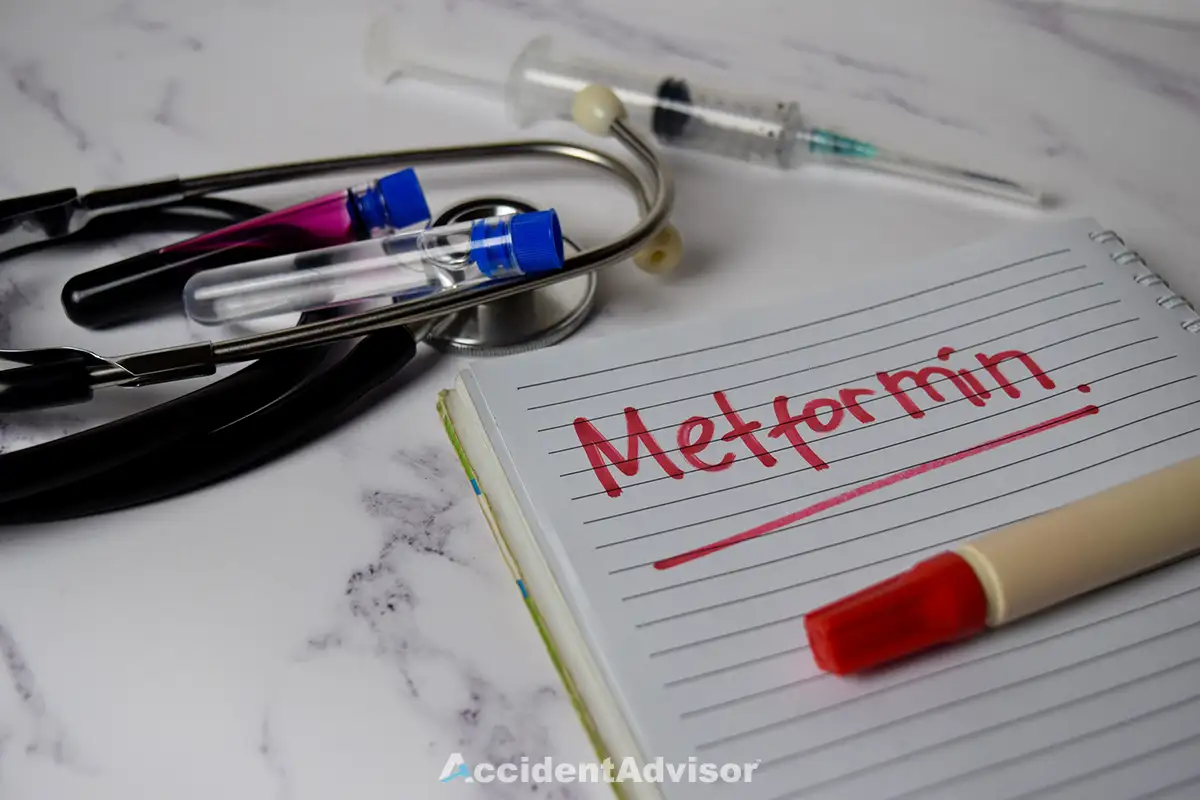For the 37.3 million Americans who suffer from diabetes, metformin is the most commonly prescribed drug. In 2020 alone, it was prescribed an estimated 92.6 million times to over 20 million people. This makes the recent metformin recall an issue that potentially affects over 6% of the U.S. population.
The metformin recall was initiated by the FDA after discovering low levels of a carcinogen, NDMA, in certain batches. Not all types of metformin were found to contain this compound, but those that did were voluntarily recalled after the FDA’s investigation. Despite this, a class action lawsuit has been filed against the manufacturers and distributors of metformin pursuing damages sustained while taking the supposedly safe medication.
If you or someone you know was diagnosed with cancer following long-term use of metformin, you may be wondering how to qualify for the class action metformin lawsuit, how much you can expect in a potential settlement, and how to file your case.
What is Metformin?
Metformin is an oral medication prescribed in doses ranging from 500-2550 mg daily, designed to treat type 2 diabetes. It has two mechanisms to encourage this effect: one by reducing the sugar content of your blood and the other by increasing your body’s insulin sensitivity.
Since insulin helps your body use up sugar as energy, more sensitivity (or increased resistance) is a good thing for your blood sugar levels. Taking metformin can lower blood sugar levels too much, especially in combination with other therapies, so it’s important to always talk with your doctor before changing or adding anything to your blood sugar routine.
Metformin comes in both fast-acting and delayed-release tablets. While the drug can help control blood sugar, it cannot cure diabetes. The dosing of the medication depends on the individual’s response over time, so doctors may change the dosage every few weeks before settling on a routine.
Metformin Recall Update
Metformin received a voluntary recall notice following FDA investigations in January 2021. This came after several drug makers responded to the FDA’s 2020 investigation by pulling the drug until more information was uncovered. These included Time-Cap, Lupin, Apotex, Teva, Amneal, and others.
Their investigation was spurred by initial findings in 2019 that foreign-made metformin contained low levels of the carcinogen, NDMA. After further investigation, even domestically made metformin was found to contain unacceptable NDMA levels, initiating the recall. That was back in May of 2020.
Note that only the extended-release metformin tablets were discovered to be contaminated with NDMA. The immediate-release form tested clean. Thankfully, the faster-acting metformin is much more commonly prescribed than the extended-release tablets so not as many people were impacted as first suspected.
The FDA noted that the NDMA may not be due to manufacturing error but to the drug’s storage conditions or an unforeseen interaction with certain people (see below for more on how NDMA can get into a medication like metformin).
What is NDMA?
N-Nitrosodimethylamine or NDMA is a compound that may cause cancer if ingested at high amounts for a short period or low amounts for an extended period, according to many studies. The metformin recall is not the first time NDMA has been discovered in pharmaceuticals. Similar contamination has been observed in ranitidine, the basis of many common heartburn medications.
Additionally, NDMA is naturally occurring in water, air, and soil, so everyone is exposed to some NDMA in their lifetime regardless of their medication use. Some foods such as cured meats, smoked fish, fermented drinks like beer, and tobacco smoke can also contain trace amounts of the chemical agent that forms NDMA in the body, known as nitrous anhydride.
These compounds have been studied for the possibility of causing liver, kidney, and respiratory tumors when over-exposed to them. Animal studies revealed that NDMA can cause cirrhosis and focal nodular hyperplasia in non-human primates, leading to researchers classifying them as potential human carcinogens.
NDMA Side Effects
The side effects of being exposed to too much NDMA differ depending on the type of exposure. Chronic exposure more frequently causes symptoms of liver damage and low platelets while high or acute exposure to a large dose can cause symptoms such as vomiting, headaches, nausea, and malaise.
Low exposure to NDMA generally does not produce symptoms. This is because the amounts of NDMA present in certain foods or water and air sources can be broken down by the liver and either exhaled or urinated within a day. It’s only when NDMA exposure reaches unacceptable limits, which differ by state but are generally set at 96 nanograms per day, that symptoms become possible.
Note that metformin has natural side effects as well, some of which overlap with those of NDMA exposure. They include weakness, indigestion, nausea, diarrhea, abdominal pain, headaches, metallic taste, a loss of appetite, and any symptoms related to low blood sugar (hypoglycemia).
Since metformin is used to treat type 2 diabetes, it’s also important to remember that diabetes has its own set of symptoms that could overlap with NDMA exposure. This results in many people being exposed to too much NDMA but unaware that it could be the source of their symptoms.
If you are experiencing any of these side effects, speak with your doctor about potential tests or treatments that could rule out the source.
How Would NDMA Get in Metformin?
NDMA might get in metformin during the manufacturing process. Contaminated medication ingredients, solvents, catalysts, and more could contain NDMA due to improper storage.
Additionally, NDMA could be formed in the body of the drug user due to a reaction between nitrous anhydride and natural bodily processes. NDMA may also be formed in the medication as a result of an unforeseen reaction to heat or light if the drug is improperly transported or stored.
Is There a Lawsuit Against Metformin?
The metformin lawsuit is a class action defective product lawsuit against the manufacturers and distributors of the drug. One such case against Granules Pharmaceuticals is still pending from March 2020. Kristin Wineinger filed against the company after experiencing health problems following prolonged exposure to the drug.
The cases use the manufacturers’ claim that the drug is “safe and effective” as a way to win compensation in light of the FDA’s discovery of NDMA in certain batches of metformin. The voluntary metformin recall aimed to get as much extended-release metformin off the shelves as possible.
However, the drug has been used by millions of people since the FDA approved it in 1994, often every day for many years. This results in thousands of potential plaintiffs who could have sustained injuries due to their ingestion of NDMA and could be eligible for compensation in the metformin lawsuit.
Does Metformin Cause Cancer?
Metformin itself does not cause cancer, but long-term exposure to even low doses of NDMA can raise an individual’s risk for cancer. After discovering unacceptable levels of NDMA in certain batches of metformin, the FDA labeled metformin as a possible cancer risk. However, taking the drug is not a guarantee of being diagnosed.
The types of cancers most commonly caused by NDMA exposure are those in the blood vessels, liver, kidneys, stomach, colon, and respiratory tract. The acceptable limit of NDMA exposure is 96 nanograms per day, but some metformin was tested by Valisure, an online pharmacy, as containing up to 1,000 nanograms.
However, not all types of metformin contain NDMA and could vary widely in amount between manufacturers and even between batches from the same manufacturer. Therefore, not everyone who has taken metformin is at an increased risk of developing cancer, but anyone who has taken it could be.
Your medical records, including test records and your doctor’s notes, are significant in linking your metformin use to your diagnosis. Though you do not have to be diagnosed with cancer to receive a settlement, your eligibility and settlement amount could change depending on the nature of your injuries.
How Much Can I Get from the Metformin Lawsuit?
It’s impossible to determine how much each plaintiff will get from the metformin lawsuit until cases in the class action settlement resolve. However, in 2022, 15 class action lawsuits topped $1 billion in payouts, so it’s safe to assume that metformin could be in that group.
The early ranitidine cancer cases, for instance, settled for $500,000 and up. However, remember that every case is different. Your ability to prove a connection between metformin use and your illness, the type of cancer you have, your family history, as well as the severity of your illness could play a role in increasing or decreasing your final settlement.
Who Qualifies for a Metformin Lawsuit?
Those who qualify for a metformin lawsuit usually must prove that they developed cancer after taking the drug for an extended period. Since metformin has been cited as causing many different types of cancer, no specific illness is a hard requirement for filing a metformin lawsuit, though the commonly cited illnesses could give a case a better chance at a high settlement.
As with any case involving long-term illnesses such as cancer, family history plays a significant role in determining your settlement. If you are at an increased risk of developing certain cancers due to family history, personal medical history, or age, your settlement may be more difficult to prove.
The insurance adjuster may claim that you developed cancer due to factors other than your metformin use. If you or someone you know has cancer and used metformin, contact an experienced personal injury lawyer to learn whether you qualify.
How to File a Metformin Lawsuit?
To file a metformin lawsuit, you will need to gather evidence to link your cancer diagnosis to metformin use. This evidence should include your medical records, doctor’s notes, metformin purchase records, medication receipts, and anything else related to your treatment.
Since the metformin recall has created a class action lawsuit, you will become one plaintiff among many. This makes it necessary to coordinate your statement of claim and filing times with other potential plaintiffs in your district.
A class action injury lawyer experienced in winning compensation for their clients in class action lawsuits is an indispensable ally. Remember that the insurance adjusters are not your friends and will try to discredit or reduce your claim.
Conclusion
The metformin recall involves numerous potential plaintiffs who have used the type 2 diabetes medication, metformin, and later developed cancer or other injuries. A class action lawsuit is currently pending for the victims of this frequently prescribed medication. While data on individual settlement amounts is not yet available, an experienced attorney can help you navigate the complex filing process and get the settlement you deserve.

Rocky Horton
Author
Rocky Horton is a health and safety expert from Chapel Hill, NC. He is the founder of AccidentAdvisor and has been featured in Forbes, Bloomberg, and other publications. Learn more.













